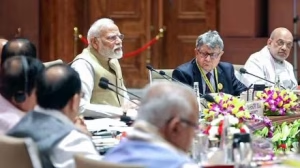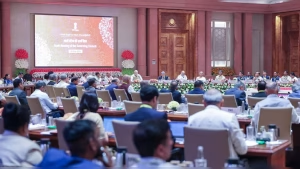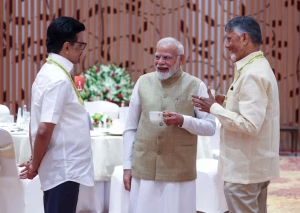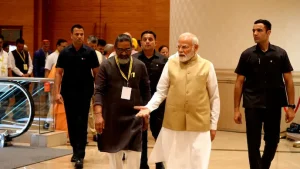New Delhi – Prime Minister Narendra Modi chaired the landmark 10th Niti Aayog Meeting at Bharat Mandapam, New Delhi, yesterday, marking a decade of collaborative governance and strategic planning. This significant Niti Aayog Meeting witnessed participation from Chief Ministers and Lieutenant Governors representing 24 states and 7 Union Territories, demonstrating unprecedented unity in India’s developmental agenda.
The Meeting commenced with a solemn minute of silence to honor the victims of the Pahalgam terrorist attack, reflecting the nation’s solidarity and respect for those who sacrificed their lives. This year’s theme, “Viksit Rajya for Viksit Bharat@2047,” established the framework for comprehensive discussions during the Meeting.
Collective Vision for National Transformation

During the Niti Aayog Meeting, Prime Minister Modi emphasized that achieving Viksit Bharat represents the aspiration of every Indian, transcending party politics to embody the collective dreams of 140 crore citizens. He stressed that when all states work together toward this common goal, India will achieve stupendous progress, positioning the Meeting as a catalyst for unified action.
The Prime Minister’s address at the Meeting highlighted the commitment required from every state, city, and village to achieve comprehensive development. He expressed confidence that with coordinated efforts discussed in the Niti Aayog Meeting, India could achieve Viksit Bharat status well before the target year of 2047.
Also Read About The North East Investors Summit 2025: PM Modi Unveils Bold & Transformative Vision
Economic Achievements and Manufacturing Focus
The Niti Aayog Meeting showcased India’s remarkable economic transformation, with the country emerging among the world’s top five economies while lifting 250 million people out of poverty. Prime Minister Modi emphasized during the Niti Aayog Meeting that India must accelerate this transformation pace to maintain momentum and achieve sustainable growth.

Manufacturing emerged as a key discussion point during the Niti Aayog Meeting, with the Prime Minister encouraging states to leverage their manufacturing strengths. The announcement of the Manufacturing Mission during the Niti Aayog Meeting signals the government’s commitment to industrial growth and job creation across all states.
Global Investment Opportunities and Trade Agreements
The Niti Aayog Meeting addressed the significant interest shown by global investors in India’s growth story. Prime Minister Modi urged states to capitalize on this opportunity by creating investment-friendly environments and streamlining processes for ease of doing business.
Recent trade agreements with UAE, UK, and Australia were highlighted during the Niti Aayog Meeting as opportunities that states should utilize optimally. The Prime Minister’s emphasis on leveraging these international partnerships demonstrates the Niti Aayog Meeting’s focus on connecting local development with global opportunities.
Skills Development and Modern Technology Integration
Education and skill development received significant attention during the Niti Aayog Meeting, with Prime Minister Modi highlighting the National Education Policy’s emphasis on these critical areas. The Niti Aayog Meeting discussions focused on planning for various skills aligned with modern technologies, including artificial intelligence, semiconductor manufacturing, and 3D printing.
The demographic dividend emerged as a key strength discussed in the Niti Aayog Meeting, with India positioned to become the world’s skill capital. A Rs 60,000 crore skilling scheme approved by the Government of India was announced during the Niti Aayog Meeting, emphasizing the need for modern training infrastructure and rural training hubs.
Cyber Security and Green Energy Initiatives
Cyber security was identified during the Niti Aayog Meeting as both a challenge and an opportunity requiring coordinated state-level responses. The discussions in the Niti Aayog Meeting emphasized the need for robust cyber security frameworks to protect digital infrastructure and citizen data.
Hydrogen and green energy received special attention during the Niti Aayog Meeting as sectors with immense potential and opportunities. The Prime Minister’s emphasis on these renewable energy sources during the Niti Aayog Meeting reflects India’s commitment to sustainable development and environmental responsibility.
Tourism Development and Global Recognition

The Niti Aayog Meeting acknowledged how the G20 Summit helped establish India as a recognized global tourist destination. Prime Minister Modi urged states during the Niti Aayog Meeting to leverage this recognition by developing at least one tourist destination of global standards and expectations.
The vision shared during the Niti Aayog Meeting includes creating 25-30 world-class tourist destinations across India, distributing tourism benefits equitably among all states. This tourism development strategy discussed in the Niti Aayog Meeting aims to boost local economies and create employment opportunities.
Urban Development and Tier City Focus
Rapid urbanization emerged as a significant topic during the Niti Aayog Meeting, with Prime Minister Modi asking states to make cities engines of sustainability and growth. The Niti Aayog Meeting emphasized particular focus on Tier 2 and Tier 3 cities as drivers of balanced regional development.
A Rs 1 lakh crore Urban Challenge Fund announced during the Niti Aayog Meeting will provide seed money for urban development projects. This substantial financial commitment discussed in the Niti Aayog Meeting demonstrates the government’s dedication to comprehensive urban transformation.
Women Empowerment and Workforce Participation
The Niti Aayog Meeting highlighted India’s tremendous Nari Shakti (women power) as a crucial strength requiring focused attention. Prime Minister Modi urged states during the Niti Aayog Meeting to implement legal reforms enabling women to join the growth trajectory more effectively.
Discussions during the Niti Aayog Meeting emphasized the need for reforms in both public and private sectors to improve working conditions for women. The focus on ease of working for women discussed in the Niti Aayog Meeting represents a comprehensive approach to gender equality in the workforce.
Agricultural Innovation and Scientific Approach
Agriculture discussions during the Niti Aayog Meeting emphasized the importance of lab-to-land approaches for sustainable farming. The Viksit Krishi Sankalp Abhiyan mentioned in the Niti Aayog Meeting will deploy approximately 2,500 scientists to villages and rural centers to promote crop diversification and chemical-free farming practices.
Prime Minister Modi’s request during the Niti Aayog Meeting for all Chief Ministers to support this scientific agricultural endeavor demonstrates the coordinated approach required for rural transformation.
Healthcare Preparedness and Digital Medicine
Healthcare service delivery emerged as a priority during the Niti Aayog Meeting, with emphasis on maintaining oxygen plant readiness and COVID-related preparedness. The Niti Aayog Meeting discussions highlighted the importance of expanding telemedicine services to connect skilled doctors from district hospitals with remote areas.
E-Sanjeevani and teleconsultation benefits were promoted during the Niti Aayog Meeting as essential tools for improving healthcare accessibility across all states.
Cooperative Federalism and Future Vision


The Niti Aayog Meeting concluded with Prime Minister Modi requesting NITI Aayog to study all suggestions made by states and Union Territories during the discussions. He observed that this Meeting represents a milestone in the institution’s decade-long journey, defining the vision for 2047.
The Prime Minister’s gratitude expressed during the Meeting to all participants reflects the collaborative spirit that has made these gatherings successful platforms for joint action and shared aspirations, ultimately strengthening India’s path toward Viksit Bharat through cooperative federalism.

